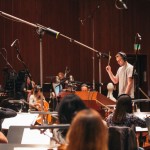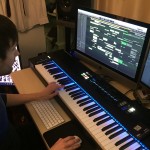Silent Hill Homecoming is almost upon us. It’s due out on September 30, and we’ve been fortunate to speak with Akira Yamaoka, who is reprising his role as composer and producer, regarding his work on the title. Not only do we discuss a new kind of fear that will be featured in the game, but we also touch on his work habits and his philosophy about games.
Yamaoka confirms that there will be a soundtrack release by the end of September, featuring approximately 70 minutes of music, and even hints at an upcoming project that he belives will be his biggest project to date.
Read the full interview with Akira Yamaoka after the jump.
OSV: Hello Yamaoka-san. It is great to speak with you. Here we are again with another Silent Hill title. Tell us what Silent Hill Homecoming is all about in your own words. What does the title mean to you, and what was your approach to the game’s music?
Yamaoka: Since this is our first next-gen Silent Hill title, I tried many new things what we weren’t able to do previously in the series. One of the biggest changes we’ve made is the implementation of surround sound, which will allow Silent Hill fans to experience an even greater level of excitement.
OSV: Silent Hill Homecoming is your second time working with a foreign-based development team. Was this time any different? Were you more hands-on with the development team in terms of the kind of music you produced, or did you simply create what you thought would be a fitting score for a Silent Hill title?
Yamaoka: I composed all the music and created all the sound effects as usual. The hardest part of collaborating with a foreign development team is making them understand the feeling of “fear” that we were looking for. In Japan, we all know “Tatari”or “Onryo”(people’s spirits come back to this world to harm those who pained them when they were living) , but Americans don’t. I spent a lot of time trying to explain this concept to the team.
OSV: We’re fairly certain that you have a soundtrack release in the works, but with the title due out in less than a month, when can we expect to hear the official announcement? How many minutes of music did you create for the game? We’re greatly looking forward to hearing the game’s soundtrack.
Yamaoka: Yes, and in fact, the soundtrack will even be released in the United States at the end of September by Konami USA [Editor’s Note: We’re pretty sure now that he meant the game and not the soundtrack]. I wrote about 70 minutes of music for Homecoming.
OSV: You’ve already confirmed that you’re working with vocalist Mary Elizabeth McGlynn on the SHH score. What can we expect this time around? Should we expect something similar to your previous collaborations with her?
Yamaoka: I know the fans have enjoyed past collaborations with McGlynn, so I tried not to change the style that fans have come to love. They are used to her voice, so that’s why I decided it’s best to continue working with her.
OSV: We really dug the light switch you recently installed in your home that’s made from old audio parts. As a proponent of this type of innovation, how does this style of thinking work its way into your game creation and music composition process? Do you feel you’ve grown as an artist alongside the Silent Hill series over the past decade?
Yamaoka: I always think being intuitive is very important. As for the light switch in my house, we shouldn’t think of it in terms of, “well, the second switch from the top is for the light in the entrance room,” but rather, “this knob is used to enter the house.” The same thing is true in video games. Being intuitive is the most important factor to me in videogame development.
OSV: As the gaming industry has grown, individuals have had to specialize more and more in order to polish every aspect of a game. You’ve had the rare opportunity to be involved with both the production and music composition in the Silent Hill series, so I wonder what your thoughts are regarding the separation and specialization of the work that goes into making a great videogame.
Yamaoka: Like Chaplin, when you have a vision of something you’d like to accomplish, and it’s so closely related to your identity, you have to do whatever you can to make it great. In my case, to express and maintain my identity, I need to both compose music and produce to aid the creation. It is quite intentional, and it requires a lot of work (I typically write music when I get home from work), but it’s very much worth it.
OSV: Being that you’ve been intimately involved with the sound of the Silent Hill series since its beginnings, do you believe this duty could ever be passed on to another composer? How do you think the fans would react?
Yamaoka: I don’t think the music could ever be passed on to another composer. I believe that it’s because of this large “load” that I am able to keep my positive attitude.
OSV: Do you have any final thoughts regarding your work Silent Hill Homecoming? Do you have a message regarding the game’s music that you want to relay to your fans?
Yamaoka: This is the first Silent Hill title on a next-gen platform, which allowed us to challenge ourselves when it came to creating the game, but not specifically aimed at the area of music (for me, the game and music are a part of the same whole). Silent Hill Homecoming has a different type of “fear.”
OSV: Can you tell us what’s next for you? Are there any announced projects that you are currently working on?
Yamaoka: I am currently working on something, but it’s unannounced. Please wait for a while, and when I can announce it, I’ll reveal something that exceeds Silent Hill, so stay tuned!
OSV: Thank you for your time. We’re looking forward to playing Silent Hill Homecoming.
Tags: Akira Yamaoka, Interviews, Konami, Silent Hill, Silent Hill Homecoming









































[…] sito OriginalSoundVersion.com ha intervistato il celebre compositore Akira Yamaoka che ha detto ottime informazioni riguardo le […]
Thank you Konami USA!!!!! I can’t wait to buy the official OST for Silent Hill: Homecoming!!!!!
…OMG!!!… he doesn’t want to pass the Genius to another composer!!!!…oh, Akira, i’ve failed you!!!…hehe…
…yay Silent Hill V OST!!!…yay Akira Yamaoka…
[…] (permalink) of 23 Original Sound Version
Lol isnt september over now?!
Where is the soundtrack?!!
Yeah, the more I’ve thought about this, the more I think he meant the GAME will be out by the end of September in the US… guess he tricked us.
Lol you are right!!
I am so looking forward the full soundtrack, those songs with Elizabeth McGlynn are just awful and cheesy!!!
[…] You wouldn’t have any idea what the deal was with the Homecoming disc? We had interviewed Yamaoka-san before the Homecoming release, and he had said that the soundtrack would be available […]
I’m not that much of a online reader to be honest but your
sites really nice, keep it up! I’ll go ahead and bookmark your site to come back down the
road. Cheers
Normally I do not learn article on blogs, but I would like to say that this write-up very pressured me to take a look at
and do it! Your writing taste has been surprised me.
Thank you, quite great article.
I was recommended this website by means of my cousin. I am
no longer positive whether or not this put up is written via him as no one
else recognise such precise approximately my problem.
You are wonderful! Thank you!
It’s hard to find experienced people in this particular topic, but you seem like you know what you’re talking about!
Thanks
Hello, all is going perfectly here and ofcourse
every one is sharing information, that’s really good, keep
up writing.
This paragraph provides clear idea in favor of the new viewers of blogging, that
in fact how to do blogging.